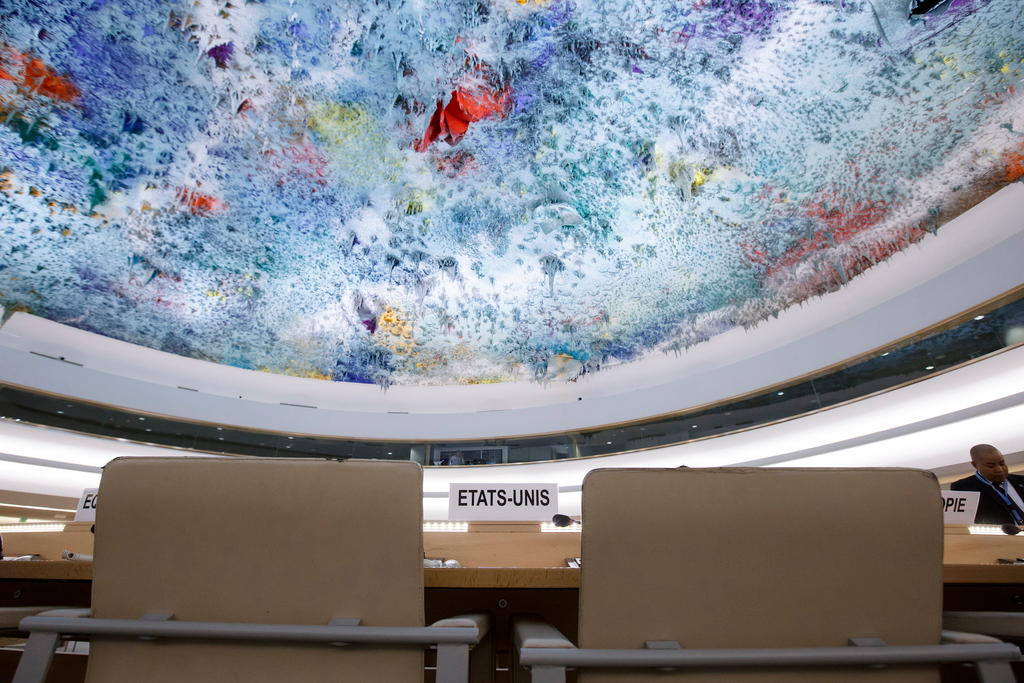When US migrant policy debates invoke the Bible
Many nations, including Switzerland, must grapple with the challenge of migration. The news of controversial recent border-security measures along the US-Mexican border has made headlines not only in North America, but in Europe as well. Almost 2,000 children have been separated from their parents between-mid April and the end of May in what many have denounced as a cruel and immoral approach to deterring unlawful crossings.
The US administration has staunchly defended this heavy-handed policy. Attorney General Jeff Sessions even cited chapter 13 of Paul’s letter to the Romans to silence clergy who protest the sharpening of anti-immigration policies. This unusual twist in the raging political debate across the Atlantic inevitably struck a chord in me, a pastor and life-long student of the New Testament.
I immediately thought of a scene in Eric Till’s 1999 biopic, Bonhoeffer – Agent of Grace. Dietrich Bonhoeffer, German theologian, had been detained in wartime Germany without charges. An investigating judge, Manfred Roeder, opens an interrogation by confronting Bonhoeffer with the same text, Romans 13. For the moment, let’s leave aside the irony that Sessions seems unaware of whose part he has taken in this exchange. Let’s simply note that both Roeder and Sessions seem to believe they’ve landed a telling blow.
Many of my fellow clergy have been quick to maintain — with some justification — that the words of the Apostle Paul have been taken out of context and that’s not what he meant. Still, I’ll confess my discomfort with these words:
“Let every person be subject to the governing authorities. For there is no authority except from God, and those that exist have been instituted by God. Therefore he who resists the authorities resists what God has appointed, and those who resist will incur judgement” (Romans 13:1–2).

These words are addressed to believers in Rome. Case closed, one might say, were it not that the authority in the city and empire of Rome when he wrote was the very Caesar, Nero, who — according to the consensus of tradition — had Paul executed. So much for “rulers are not a terror to good conduct, but to bad” (verse 3). The emperor might conclude that adhering to an unpopular belief was worth the death penalty. That does not mean he was right. In a similar way, a government in our day might decide to violate human rights and be wrong.
My struggle with this text doesn’t end with this uncomfortable knowledge. I’m troubled as well by how this seemingly blanket pre-approval of whatever the emperor decrees as God-ordained corresponds to something else Paul wrote. It sits uneasily alongside the lesson Paul drew from the crucifixion of Jesus, the result of cooperation between the Sanhedrin and Pontius Pilate. The one responsible for divine justice, the other for civil. Paul puzzled over this flagrant miscarriage of justice in “the word of the cross,” 1 Corinthians 1:18. The crucifixion indicated to Paul something in the structure of the cosmos was fundamentally flawed.
Well-ordered universe?
This runs counter to the assumption behind Paul’s words to the Romans, which envision a well-ordered universe in which all flows hierarchically from the top-down, all according to divine will. I’m mystified as to why the same Paul who was so probing in his analysis of the meaning of the crucifixion could write this dire warning against challenging temporal authority. Perhaps he was afraid his correspondence would be read by outsiders and wanted to avoid the suspicion that adherents of this new movement were subversive. Or it might be that he feared that some, in the eager expectation of an imminent end of the world, might shirk their civic responsibilities. But I don’t really know.
What I do know is that one can’t read Romans 13 without an awareness that it reflects a worldview that is no longer ours. I no longer believe in a great chain of being that leads like steps of a ladder to the highest good. Paul’s “word of the cross,” however, does help me understand the world we live in.
‘With liberty and justice for all’
It’s not enough to recognise the philosophical assumptions that underpin what Paul wrote. We have our own assumptions about the world. Our faith in free trade, for instance, or international cooperation, education, and free and fair elections. I grew up surrounded by people who shared these articles of faith. They still make sense to me, but to how many others? As a child, I began each school day speaking a pledge in unison that ended “. . . with liberty and justice for all.” I continue to believe that as deeply as I believe words that Jesus spoke a few days before his crucifixion:
“I was a stranger and you welcomed me, I was naked and you clothed me, I was sick and you visited me, I was in prison and you came to me. . . Truly, I say to you, as you did it to one of the least of my brethren, you did it to me” (Matthew 25:35–40).
Most of the time, politics is a matter of negotiating a panoply of interests, needs, and values. I’m wary of reducing every issue to black-and-white. Yet there are moments — and the current policy of programmatic inhumanity as an instrument of deterrence is one —when it must be named for what it is.
It is evil.
Obliged to resist
When confronted with Romans 13 in the film scene I mentioned, Bonhoeffer replies, “Are we here to discuss theology?” This is not because he was unable to give a theological answer to Roeder’s abuse of Paul’s letter. It concerned a passage Bonhoeffer had long wrestled with, schooled as he was as a member of the Prussian upper-middle class that found it difficult distinguish the will of the Kaiser from the will of God. Yet he concluded that there are certain rare occasions when a Christian is not only permitted to resist, but obligated. This is no doubt one of them.
At the very least, concerned citizens are right to speak up, as they have been doing, all across the political spectrum. To suggest, as the Attorney General has done, that Christians pastors shouldn’t do this is both an abuse of scripture and a display of ignorance of the noble American tradition of dissent.
The views expressed in this article are solely those of the author, and do not necessarily reflect the views of swissinfo.ch.
Opinion series
swissinfo.ch publishes op-ed articles by contributors writing on a wide range of topics – Swiss issues or those that impact Switzerland. The selection of articles presents a diversity of opinions designed to enrich the debate on the issues discussed.

In compliance with the JTI standards
More: SWI swissinfo.ch certified by the Journalism Trust Initiative




You can find an overview of ongoing debates with our journalists here . Please join us!
If you want to start a conversation about a topic raised in this article or want to report factual errors, email us at english@swissinfo.ch.